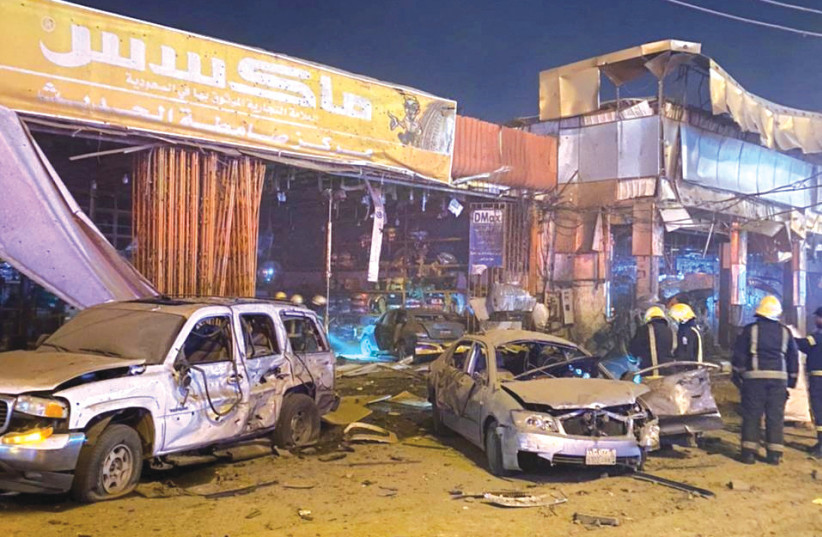The Iran-backed Houthis targeted the United Arab Emirates for the second time in a week on Monday morning. This comes in the wake of reports that air-defense systems last Monday had intercepted some of the threats. Last week, the attack involved drones, ballistic missiles and cruise missiles. The second attack appears smaller but, nevertheless, now indicates the Houthis believe they have a right to expand the war to the UAE.
This is important because unlike Houthi attacks on Saudi Arabia, the UAE is a major hub of international trade and tourism. It also is populated by a large expat community from all over the world. The Houthis, backed by Iran, have a goal to show they can stop air traffic into the UAE and disrupt normalcy. As the UAE has strived to be part of a stabilizing group of countries, it is now being targeted by Iran.
The Houthis openly bragged about their targeting of the UAE, and Iranian media have repeated their warnings. The goal is to show they can openly say what they will do and then do it. There have been no real repercussions so far. After the first attacks, there were bombing raids on the Houthis by the Saudis, apparently, but these resulted in casualties that were then condemned. Western media said the airstrikes had killed people at a prison. This didn’t appear like a very helpful retaliation, and all it led to was another Houthi propaganda spiel claiming a “crime against humanity.” This distracts from the fact the Houthis are now trying to rain missiles down on Abu Dhabi.
<br>The new Houthi missile attack
Monday’s attack was reported by Iranian media. The semi-official Fars News Agency said it was relying on Sputnik, a Russian state-owned news agency, for information. There were reports of activation of air defenses, and explosions were heard, which might have been from the interceptions, Fars said.
“It is not yet clear what caused the explosion and the sound of the alarm, and official sources have not released any news about it,” Fars reported. It said the Sabareen news outlet, which is affiliated with Iran-backed militias, had published “images of smoke in the sky of Abu Dhabi.”
It is important to remember these reports appeared early in the morning.

“The UAE Army air defenses were activated in the early hours of Monday morning to deal with hostile targets, and leaked images show the system intercepting several rockets,” Sputnik reported. “Eyewitnesses reported hearing at least four explosions.”
Passenger planes were halted, and a “no-fly” area was established, the report said, adding that the Houthis have warned that any targeting of Yemen by the UAE would result in more of these attacks.
“Videos posted to social media show the sky over the capital light up before dawn, with points of light looking like interceptor missiles in the sky... the missile fire disrupted traffic into Abu Dhabi International Airport for about an hour,” the Associated Press reported.
The ability of the Iran-backed Houthis to stop air traffic at a major international airport is important. It shows their growing threat and range. They are graduating to a major regional threat and Iranian proxy.
Much as Hezbollah became an international threat, with tentacles stretching to South America and Africa, the Houthis have been put on steroids by Iran’s backing. They receive technology such as drones and missiles. The Iranians use them as a test bed for new drone and missile technology. They give Iran influence over the Red Sea, where Iran has sent IRGC spy ships.
In addition, Iran has posted key IRGC officials to Yemen. A top Iran diplomat, who was likely also an IRGC adviser to the Houthis, died of COVID in December after serving in Yemen.
<br>Iranian technology being tested on UAE
Monday’s attack also came a day after Israel’s foreign minister and science and technology minister announced a hi-tech investment fund with the UAE. The Israeli initiative envisions a “binational industrial R&D fund with the UAE, which will support requests for joint activities between Israeli and Emirati companies,” the ministries said in a joint statement. “The fund’s support will enable access to international resources, knowledge, technology and infrastructure that currently do not exist in Israel and will also enable assistance to Israeli companies through recruitment of local partners, compliance with foreign regulations and the creation of marketing, economic or business advantages.”
Iranian media reports have often said the Houthis are waging a war not only against Saudi Arabia and now the UAE but also are part of the broader Iranian “resistance” against the US and Israel. In January 2021, reports said Iran had sent the Shahed-136 drone to Yemen. The drone has a range of some 2,000 km. and could reach Israel.
Israel has expressed solidarity with the UAE in the face of the attacks. However, the overall context of Tehran’s expansion of the Houthi war to the skies of Abu Dhabi shows how the Iranian threat to the region is rapidly growing to include a hand in attacks across an arc of some 3,000 km. from Lebanon to the Gulf. “Israel and the United Arab Emirates share a passion for the development of advanced technologies, which will improve quality of life, the environment and the economy,” Foreign Minister Yair Lapid said Sunday. While Israel and the UAE want to invest in technology to improve the quality of life, Iran’s message is that it can seek to destabilize the quality of life throughout the region.
